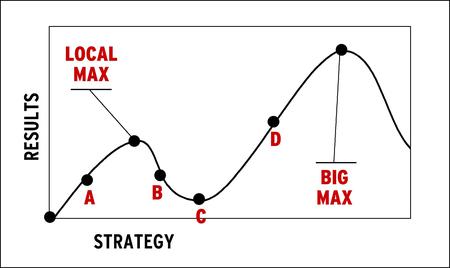What Are You Doing to Feel Uncomfortable?

Founder CEO @ Buffer
I believe that when you’re building a startup, it is as much about developing yourself as it is about developing your startup.
Recently I’ve realised that “feeling uncomfortable” is just what I need.
Why is it a good thing to feel uncomfortable?
Seth Godin describes why we should feel uncomfortable using the following chart:

Godin argues that most people reach some comfortable “Local Max” and then stay there, because to jump to new heights almost always involves some discomfort:
“The problem is that to get to Big Max, you need to go through step C, which is a horrible and scary place to be.”
In The Power of Full Engagement by Jim Loehr and Tony Schwartz, which I’ve mentioned before, the authors say that stress is a crucial part of growth:
“Any form of stress that prompts discomfort has the potential to expand capacity – physically, mentally, emotionally or spiritually – so long as it is followed by adequate recovery.”
I think the need to get out of your comfort zone is even more true when you’re building a startup. Ben Yoskovitz puts this well:
“Don’t start a company as a tech person if all you want to do is code. If all you want to do is code, then get a job coding. Starting a company means to do a lot of things you’ve never done, and a lot of things you won’t be comfortable doing. Get used to it. Make the uncomfortable comfortable.”
Shifting from uncomfortable to comfortable
I’ve found in the past that if I get excited about something and dive in too fast, I will often work for longer than I realise is productive and then burn out. This makes for a bad experience and makes it easy to avoid trying again.
I think a better approach is what Loehr and Schwartz propose: To go beyond our comfortable levels and then step away and renew. Repeating this process can build our capacity to do anything and make us comfortable with new things.
Of course, when something becomes more comfortable we should strive to get out of our comfort zones once again. The compounding effect can be very powerful.
Growth in one area can mean confidence in other areas
A great side effect I’ve found of stepping out of my comfort zone in one area, such as speaking at events or stepping up my exercise routine, is that growing my skill or capacity in one of these areas can give me a massive amount of confidence in almost every other area of my life.
This is a good reason why we should have many areas where we stretch ourselves. Here is a great part of an interview Tim Ferriss had with Matt from 37signals:
“If your entire ego and identity is vested in your startup, where there are certainly factors outside of your control, you can get into a depressive funk that affects your ability to function. So you should also, let’s say, join a rock climbing gym. Try to improve your time in the mile. Something like that. I recommend at least one physical activity. Then even if everything goes south — you have some horrible divorce agreement with your co-founder — if you had a good week and set a personal record in the gym or on the track or wherever, that can still be a good week.”
Some of the things I’m doing to feel uncomfortable
Working on a startup has given me many opportunities to feel uncomfortable and therefore gain skills in many areas I was never comfortable with. Here are some of my top ones:
Speaking: Believe it or not, I’m actually an introvert. I squirm on a stage, but I get a kick out of sharing my story and helping others, and that’s why I am always pushing myself in this area. I’ve now spoken at quite a few events of various sizes, and I usually say yes to speaking opportunities precisely because I know I find it uncomfortable. It’s definitely getting easier.
Sleep, health and exercise: I’ve always struggled with getting enough sleep and keeping up a gym routine. Over the last few months I’ve managed to put in place a sleep ritual which I’ve kept to almost religiously. I then created a morning gym routine, and for the last few weeks I’ve been to the gym every weekday morning at 6:30 a.m. With the consistency handled, I’m now pushing myself out of my comfort zone further by making my weight training routine harder and keeping track of my progress.
There are many others, too: even writing blog posts like this is something I still find hard to keep up. And since I’m primarily a developer, in the past I’ve had to push myself to become a better designer and deal with server admin tasks for Buffer.
What are you doing to feel uncomfortable?
That brings me back to the title of the post. Have you thought about whether things are getting a little too comfortable?
What are you doing to push yourself out of your comfort zone? I’d love to hear from you in the comments, I am sure there is much we could all learn about pushing ourselves further.
Try Buffer for free
180,000+ creators, small businesses, and marketers use Buffer to grow their audiences every month.
Related Articles

I recently attended my first in-person, international conference. Here's what I learned.

What it was like to join a fully remote team like Buffer, and how going on the company retreat so early on helped shape my journey in ways I hadn’t imagined.

If you’ve followed Buffer for a while, then you know we have a few uncommon approaches to teammate benefits and compensation. The example I’ll dig into today is our “Dependent Grant,” which we launched in 2016. Our Dependent Grant is separate benefit, outside of salary, that we grant teammates who are taking care of and supporting family members. It’s an extra $3,000 USD per year per child, up to four dependents total. This has been one of our most unusual (and at times controversial) benefits